Jennie Gubner and Alana Jackson Win the a2ru Award for Excellence in Arts in Health Education
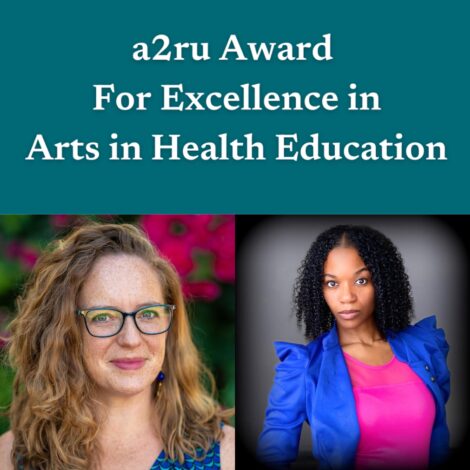
Oct 19, 2023
At the opening session of its 2023 National Conference on October 19, a2ru announced the first two winners of the new a2ru Award for Excellence in Arts in Health Education: Jennie Gubner from the University of Arizona and Alana Jackson from the University of Florida.
a2ru created this award, in partnership with its Community of Practice of Arts in Health Educators, to recognize outstanding and innovative pedagogy that supports the rapid growth of arts in health. This is a vitally important area of interdisciplinary research and practice dedicated to using the power of the arts to enhance human health and well-being in diverse institutional and community contexts.
Maryrose Flanigan, a2ru Executive Director, says: “We are thrilled to recognize the ground-breaking work that is being done in the dynamic field of arts in health. The quality of applications we received really opened my eyes to not only the depth of expertise and talent; but also the urgency and readiness for this work to be better supported and scaled in our network. We wish to thank the Arts in Health Community of Practice for creating this award we are honored to convey on their behalf.”
An independent panel of judges evaluated this year’s outstanding pool of nominees for their demonstrated excellence and effectiveness in teaching and advocacy for student learning and perspectives and/or their development of an academic program in the form of a course, certificate, or degree, and well as their demonstrated commitment to equitable and just teaching practices.
This year’s judges were:
- Donna T. Chen, MD, MPH, Professor in the Center for Health Humanities and Ethics, the Department of Public Health Sciences, and the Department of Psychiatry and Neurobehavioral Sciences, University of Virginia School of Medicine;
- Adam Eickmeyer, MPH, Director of Medical School Education, University of Chicago Pritzker School of Medicine; and
- Aaron Levy, PhD, MPhil, Director of Health Humanities Initiatives, Penn Medicine; Senior Lecturer, Departments of English and the History of Art; and Senior Fellow, School of Social Policy & Practice, University of Pennsylvania.
Moving forward, the a2ru Award for Excellence in Arts in Health Education will be offered annually; nominations for the 2024 awards will open in Summer 2024.
About the Winners
Jennie Gubner:
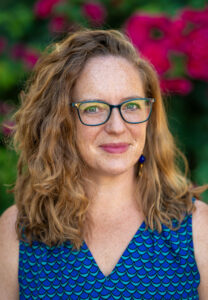 Jennie Gubner is a socially engaged interdisciplinary scholar, educator, violinist, visual ethnographer with a PhD in Ethnomusicology from UCLA. At the University of Arizona, she works as an Assistant Professor in the School of Music and Chair of an innovative new Graduate Interdisciplinary Program in Applied Intercultural Arts Research. Her research specializations include applied and intercultural approaches to the study of music and dementia and creative aging; intergenerational tango bars as spaces of urban belonging in Buenos Aires; participatory music scenes as vehicles for social activism and community building; and audiovisual, multimodal and arts-based approaches to public ethnography. Central to her research agenda has been the development of interdisciplinary undergraduate and graduate university courses about health, wellness and creative aging from perspective of the arts.
Jennie Gubner is a socially engaged interdisciplinary scholar, educator, violinist, visual ethnographer with a PhD in Ethnomusicology from UCLA. At the University of Arizona, she works as an Assistant Professor in the School of Music and Chair of an innovative new Graduate Interdisciplinary Program in Applied Intercultural Arts Research. Her research specializations include applied and intercultural approaches to the study of music and dementia and creative aging; intergenerational tango bars as spaces of urban belonging in Buenos Aires; participatory music scenes as vehicles for social activism and community building; and audiovisual, multimodal and arts-based approaches to public ethnography. Central to her research agenda has been the development of interdisciplinary undergraduate and graduate university courses about health, wellness and creative aging from perspective of the arts.
Gubner has published and presented her award-winning research and short films in premier music, humanities, and medical research journals, edited volumes, and conferences including the Yearbook for Traditional Music and the Journal of the American Geriatrics Society. She is a Senior Atlantic Fellow for Equity in Brain Health through the Global Brain Health Institute and a founding partner of the Erasmus+ European Union multi-year initiative “Encounters between Arts, Ethnography, and Pedagogy.”
Her recent research projects have involved building and creatively documenting a house-calls musical serenade program for home-bound Hispanic older adults in Tucson, and designing an interactive an interactive digital platform called The Awe Collective to promote creative approaches to awe walking as a wellness practice. She is currently developing another platform called the Music and Creative Aging Story Lab, and organizing series of community events to promote participatory music making as a vehicle for building age-friendly communities. As a violinist she loves playing folk and popular music from North and South America and plays in a South American folk music trio called El SurCo.
In their decision, the judging panel cited Dr. Gubner’s “extraordinary teaching and scholarship at the intersection of memory, dementia, and Alzheimer’s care.” Her colleagues from around the country echo this praise. Daniel Reed from Indiana University wrote “Dr. Gubner is a fabulous teacher and a groundbreaking researcher. Integrating research in neuroscience and the arts, Dr. Gubner for nearly a decade has engaged in efforts to better understand music’s effects on the brain, especially the brains of older adults with dementia.” Theresa Allison of the University of California San Francisco School of Medicine shared: “Dr. Gubner is breaking new theoretical ground through the use of service-learning pedagogy and arts-based intergenerational projects to improve quality of life for people living with dementia. In the process, she is building a much-needed dementia care workforce by training pre-health sciences undergraduate students to view people with dementia through a more humane lens” Aaron Colverson, Postdoctoral and Atlantic Fellow, Global Brain Health Institute, seconded her impact on young scholars in his letter of recommendation, writing: “Dr. Gubner’s integration of ethnomusicological methods into the dementia care space enabled my and many others’ awareness of the availability to conduct such work. I have since devoted my career to supporting Dr. Gubner’s vision and mission.”
Alana Jackson:
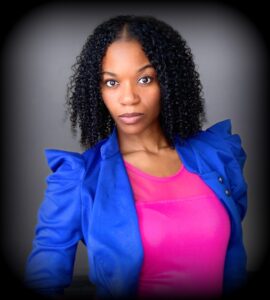 Alana Jackson is a multi-modal artist-visionary and speaker working at the intersections of arts, entertainment and public health. As a lecturer with the University of Florida’s Center for Arts in Medicine, Alana’s focus has been to prepare students as artists, scholars, and citizens who can use their ‘superpowers’ to be catalysts for positive change. Her work facilitating arts engagement to empower patients and communities has spanned from juvenile justice settings, to hospitals and schools, in addition to spearheading community programs for adults facing neurodegenerative conditions. She is the founder and former director of a dance for Parkinson’s program based on Dance for PD. In her current work, she co-directs SPARC352, a collaborative initiative that engages community-city-university partnerships as a means to promote healthy, thriving communities. She advocates for the power of the arts as a tool for agency and resilience in both her work around arts and recovery in the face of disaster, as well as her work in youth empowerment programs. Here work with youth often connects arts to literacy, STEM, entrepreneurial mindset, learner identities, and health. An Artist, Strategist, and Communicator, Alana has extensive experience developing vision for community engagement and helping organizations to build and sustain programs. Alana continues to leverage her experience as a songwriter, dancer, and spoken word artist to inspire individuals to be agents for joy, wellness, and transformation in their own lives and communities.
Alana Jackson is a multi-modal artist-visionary and speaker working at the intersections of arts, entertainment and public health. As a lecturer with the University of Florida’s Center for Arts in Medicine, Alana’s focus has been to prepare students as artists, scholars, and citizens who can use their ‘superpowers’ to be catalysts for positive change. Her work facilitating arts engagement to empower patients and communities has spanned from juvenile justice settings, to hospitals and schools, in addition to spearheading community programs for adults facing neurodegenerative conditions. She is the founder and former director of a dance for Parkinson’s program based on Dance for PD. In her current work, she co-directs SPARC352, a collaborative initiative that engages community-city-university partnerships as a means to promote healthy, thriving communities. She advocates for the power of the arts as a tool for agency and resilience in both her work around arts and recovery in the face of disaster, as well as her work in youth empowerment programs. Here work with youth often connects arts to literacy, STEM, entrepreneurial mindset, learner identities, and health. An Artist, Strategist, and Communicator, Alana has extensive experience developing vision for community engagement and helping organizations to build and sustain programs. Alana continues to leverage her experience as a songwriter, dancer, and spoken word artist to inspire individuals to be agents for joy, wellness, and transformation in their own lives and communities.
The Judges hailed her “dedication to students and the effectiveness and care inherent in her teaching;” they continued, “She uses community-engaged research, arts practices, and place-making to promote health communities and community development. She brings teaching and learning out of the academy and into community through collaborative partnerships.” Her colleagues at the Center for Arts in Medicine concur. Alyson Maier Lokuta wrote, “As an artist and strategist, Alana listens deeply and pursues connection and partnership on campus and beyond to create multidisciplinary approaches that can strengthen our communities and the university’s work as a whole.” Jenny Bexley Lee asserted: “As a service learning lecturer…Alana exemplifies outstanding teaching, research, creative activity, and service.” Bella Schaerf, a former student and current occupational therapy doctoral student, shared of Jackson: “She created room to be our authentic selves, which taught me to give clients the space to exist without boundaries,labels, and diagnoses. In line with Arts and Health philosophies, Alana honors individuals where they are in their journeys of growth and healing and teaches her students to do the same. Every time I facilitate a dance class or work with clients at clinical rotations, I accept and honor them for who they are, because of Alana’s teachings.”
About the Judges:
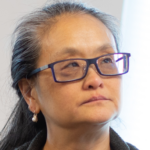 Dr. Donna T. Chen, MD, MPH, is a Professor in the Center for Health Humanities and Ethics, the Department of Public Health Sciences, and the Department of Psychiatry and Neurobehavioral Sciences at the University of Virginia School of Medicine.
Dr. Donna T. Chen, MD, MPH, is a Professor in the Center for Health Humanities and Ethics, the Department of Public Health Sciences, and the Department of Psychiatry and Neurobehavioral Sciences at the University of Virginia School of Medicine.
Over her professional career, Donna has had the privilege of engaging with many groups of people — teaching, mentoring, and learning with undergraduate/graduate students, practicing professionals, and communities of “non-academics.” In academic settings, she has (co)designed and (team-)taught multiple interdisciplinary elective courses, workshops, and faculty development programs bringing together people from medicine, public health, nursing, law, business, education, data science, engineering, and various arts and sciences disciplines. For the past 14 years she has led the Ethics, Professionalism, and Humanities curricular thread for the four-year medical student core curriculum. In 2021, she was awarded University of Virginia’s All-University Teaching Award.
In April 2022, Donna had a stroke and learned that she has a rare condition called Moyamoya. Her ongoing recovery process has rekindled her love of the creative arts and her appreciation for their power to guide and sustain her in finding and making meaning, exploring vulnerability, and learning to thrive in uncertainty. Embracing both the personal and the professional potential of the creative arts, she is collaborating with a host of stakeholders to create the UVA Center for Health Humanities and Ethics FusionLab to bring together artists, scholars, and scientists to nurture interdisciplinary efforts for promoting new ways of seeing and advancing knowledge for health, education, and social justice.
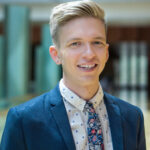 Adam Eickmeyer, MPH is the director of medical school education at the University of Chicago Pritzker School of Medicine. Adam was previously the academic director of the U-M Health Sciences Scholars Program, an interprofessional, undergraduate pre-health residential learning community; he maintains a lecturer appointment at U-M where he teaches a course on the intersections of sexual orientation, gender identity, and race as they relate to health. Adam has also taught courses on health policy and the U.S. health care system, England’s National Health Service, HIV/AIDS, cancer, and more. Adam has enjoyed incorporating the arts into his teaching to discuss difficult topics such as racialized violence, HIV/AIDS, and cancer through graphic novels, theater, music, physical art exhibits, and other media.
Adam Eickmeyer, MPH is the director of medical school education at the University of Chicago Pritzker School of Medicine. Adam was previously the academic director of the U-M Health Sciences Scholars Program, an interprofessional, undergraduate pre-health residential learning community; he maintains a lecturer appointment at U-M where he teaches a course on the intersections of sexual orientation, gender identity, and race as they relate to health. Adam has also taught courses on health policy and the U.S. health care system, England’s National Health Service, HIV/AIDS, cancer, and more. Adam has enjoyed incorporating the arts into his teaching to discuss difficult topics such as racialized violence, HIV/AIDS, and cancer through graphic novels, theater, music, physical art exhibits, and other media.
Adam earned his BA and MPH at the University of Michigan before completing a policy fellowship with the Gill Foundation in Washington, D.C. where he worked on policy issues impacting LGBTQ+ Americans’ health and well-being. He is currently in the early stages of PhD work with the Maastricht University School of Health Professions Education in the Netherlands.
 Aaron Levy, PhD, MPhil is the inaugural Director of Health Humanities Initiatives at Penn Medicine; Senior Lecturer in the Departments of English and the History of Art; and Senior Fellow in the School of Social Policy & Practice at the University of Pennsylvania. Dr. Levy is the Director of the Health Ecologies Lab, co-Director of the Rx/Museum Initiative, as well as the Director of the Penn Medicine Listening Lab — an innovative approach to patient experience which has produced over 75 stories from patients, caregivers, staff, and providers across six hospitals that have been accessed over 30,000 times. He is the author or editor of several publications about these topics, including: On Listening as a Form of Care (2020); On the Poetics and Politics of Health (2021); The Language of Care: Stories from the Penn Medicine Listening Lab (2021); and Rx/Museum: 52 Essays on Art and Reflection in Medicine (2022).
Aaron Levy, PhD, MPhil is the inaugural Director of Health Humanities Initiatives at Penn Medicine; Senior Lecturer in the Departments of English and the History of Art; and Senior Fellow in the School of Social Policy & Practice at the University of Pennsylvania. Dr. Levy is the Director of the Health Ecologies Lab, co-Director of the Rx/Museum Initiative, as well as the Director of the Penn Medicine Listening Lab — an innovative approach to patient experience which has produced over 75 stories from patients, caregivers, staff, and providers across six hospitals that have been accessed over 30,000 times. He is the author or editor of several publications about these topics, including: On Listening as a Form of Care (2020); On the Poetics and Politics of Health (2021); The Language of Care: Stories from the Penn Medicine Listening Lab (2021); and Rx/Museum: 52 Essays on Art and Reflection in Medicine (2022).
